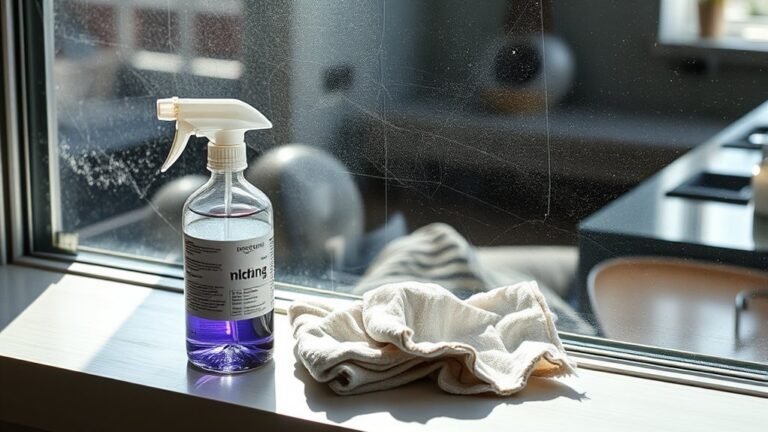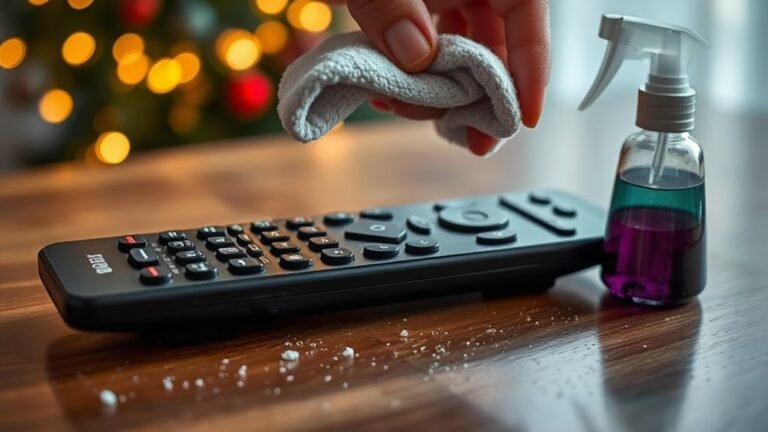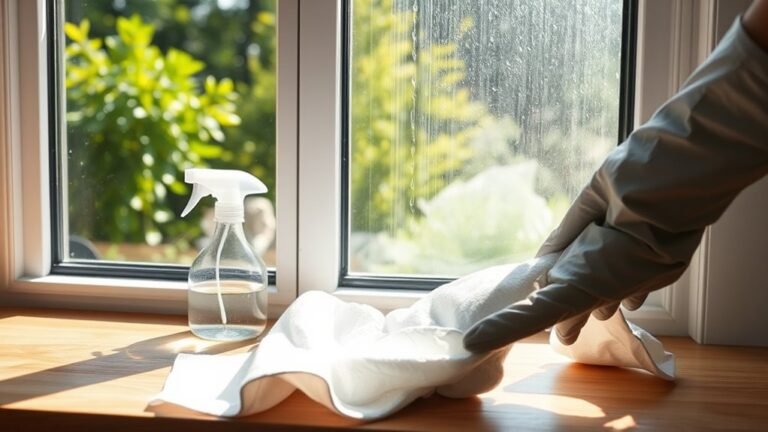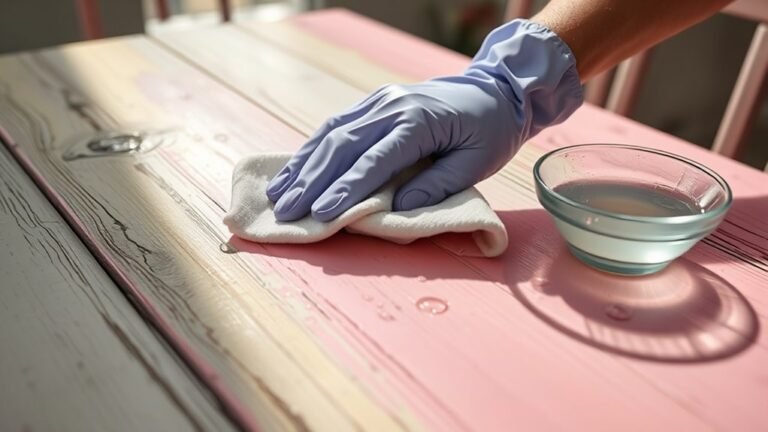Cleaning With Glass: What Works and What Doesn’T
When cleaning glass, avoid abrasive tools and harsh chemicals that can scratch or damage the surface. Use microfiber cloths and squeegees for effective dirt removal without streaks. Natural solutions like vinegar and water work well, but don’t over-saturate the glass to prevent smudges. Regular polishing helps keep minor scratches at bay and maintains clarity. If you want to master streak-free, spotless glass, understanding the right techniques and tools is key—there’s more helpful info ahead.
Common Mistakes When Cleaning Glass

Why do so many people struggle with cleaning glass effectively? It often comes down to glass cleaning myths that lead you astray. You might think using newspaper or vinegar alone will give you streak-free shine, but these shortcuts often leave you frustrated. Another common mistake is improper drying—when you don’t dry the glass properly, water spots and streaks become inevitable. You want your glass to be clear and free, not clouded by residue or smudges. Remember, cleaning glass isn’t about quick hacks; it’s about understanding what works and what doesn’t. By avoiding these myths and drying mistakes, you’ll gain the freedom to enjoy sparkling, flawless glass surfaces without the hassle.
Best Tools for Glass Cleaning
When it comes to sparkling glass, having the right tools makes all the difference. You’ll want to focus on essential items that effectively remove dirt without leaving streaks. Let’s explore which materials will give you the best results every time.
Essential Glass Cleaning Tools
Although cleaning glass might seem straightforward, having the right tools can make a huge difference in achieving a streak-free shine. You’ll want to rely on effective glass cleaning gadgets paired with eco friendly cleaners to keep your surfaces sparkling without harsh chemicals. Freedom from streaks starts with the right essentials.
| Tool | Purpose | Eco Friendly Option |
|---|---|---|
| Microfiber Cloth | Removes dirt & grime | Reusable & washable |
| Squeegee | Clears liquid efficiently | Bamboo handle version |
| Spray Bottle | Dispenses cleaner evenly | Refillable glass bottle |
Choosing Effective Cleaning Materials
Since your goal is a spotless, streak-free finish, choosing the right cleaning materials is essential. You’ll want to look beyond traditional products and embrace eco friendly options that protect both your glass and the planet. Microfiber cloths are a must—they’re gentle, reusable, and highly effective at trapping dirt without leaving lint behind. Pair them with innovative products like spray bottles designed for even misting or natural cleaning solutions made from vinegar or citrus. Avoid paper towels or abrasive sponges, which can scratch or leave streaks. By selecting materials that combine efficiency with sustainability, you not only free yourself from harsh chemicals but also guarantee your glass surfaces shine brilliantly. Your cleaning routine becomes quicker, safer, and more satisfying.
Effective Cleaning Solutions for Glass

Anyone looking to achieve spotless glass knows that choosing the right cleaning solution makes all the difference. You don’t have to rely on harsh chemicals; natural cleaning options can give you the freedom to clean safely and effectively. Simple mixtures like vinegar and water or lemon juice combined with water work wonders without harming the environment. Eco friendly solutions not only protect your health but also reduce your carbon footprint. You’ll find these alternatives just as powerful at cutting grease and grime, leaving glass crystal clear. Embracing natural, eco friendly cleaning lets you maintain your space without compromise, keeping your glass surfaces shining bright while supporting a cleaner planet. Switch to these solutions and enjoy streak-free results without any guilt.
Techniques to Avoid Streaks and Smudges
When you want your glass surfaces to look flawless, mastering the right techniques is just as important as choosing the right cleaner. Start by using a microfiber cloth; it’s excellent for streak free techniques because it traps dirt without leaving fibers behind. Avoid paper towels—they often cause smudges and streaks. Clean in a circular motion, then finish with vertical strokes to prevent streaks from forming. Don’t over-saturate your cloth or glass; too much liquid invites drips and smudges. For smudge prevention, wear cotton gloves or handle glass minimally after cleaning. Also, clean your cloth regularly to avoid spreading grime. By following these simple streak free techniques and smudge prevention tips, you’ll enjoy crystal clear glass that reflects your freedom to live spotless and stress-free.
How to Remove Tough Stains and Marks

When you’re tackling tough stains and marks on glass, knowing the right methods can make all the difference. You’ll want to avoid common mistakes that can make stains worse or damage the surface. Let’s explore effective stain removal techniques that get your glass sparkling clean without hassle.
Effective Stain Removal Methods
Although glass is durable, tough stains and marks can still be stubborn to remove. To reclaim your glass’s shine, you’ll want to choose the right stain removal methods. Start with gentle cleaning solutions like a mixture of vinegar and water or a mild dish soap solution. These are effective for everyday grime without damaging the surface. For tougher stains, try rubbing alcohol or a paste made from baking soda and water—both break down dirt without harsh chemicals. Apply your chosen solution with a soft cloth, gently rubbing in circular motions to lift marks. Remember, patience is key; sometimes, repeated applications are necessary. With these methods, you’ll regain spotless glass, freeing yourself from stubborn stains without sacrificing the integrity of your surfaces.
Common Mistakes to Avoid
Removing tough stains from glass can sometimes lead to mistakes that make the problem worse or damage the surface. You want to avoid over saturation issues, which can leave streaks or cause damage if liquid seeps into edges. Improper drying also creates water spots and streaks, undoing your hard work.
Here’s a quick guide to keep you on track:
| Common Mistake | Why It’s Harmful |
|---|---|
| Over Saturation | Causes streaks, damages edges |
| Using Abrasive Tools | Scratches glass surface |
| Improper Drying | Leaves water spots, streaks |
Stay mindful of these pitfalls, and you’ll keep your glass sparkling without restrictions holding you back.
Tips for Cleaning Large Glass Surfaces
Since large glass surfaces can be tricky to clean without leaving streaks or smudges, you’ll want to use the right tools and techniques. Start by choosing cleaning solutions suitable for the glass surface materials you’re working with—some materials need gentler cleaners. For large window techniques, use a squeegee with a smooth, even stroke from top to bottom, wiping the blade after each pass to prevent drips. Microfiber cloths are your best friend for catching residue without scratching. Avoid cleaning glass in direct sunlight, which can cause streaks as the solution dries too fast. If the surface is very tall or wide, consider using an extension pole or a lightweight ladder to reach every corner safely. With the right approach, you’ll enjoy spotless freedom through crystal-clear views.
Caring for Specialty Glass Types
When you’re dealing with specialty glass types like tempered, frosted, or stained glass, you’ll need to adjust your cleaning methods to protect their unique surfaces. For tempered glass, use a soft cloth with mild detergent, avoiding harsh chemicals that could weaken its strength. Frosted and etched glass demand gentle wiping to preserve their texture—abrasive scrubbing might dull the finish. Stained glass and decorative glass require extra care; stick to a damp cloth and avoid excessive moisture to protect the lead or solder joints. When caring for glass art or glass displays, handle with care and clean gently to maintain their beauty. For mirror care and glass cookware, safety tips include using non-abrasive cleaners and drying properly to prevent streaks and damage.
Maintenance Tips to Keep Glass Sparkling
Keeping your glass surfaces looking their best goes beyond just choosing the right cleaning methods for specialty types. To maintain that sparkling clarity, you’ll want to embrace routine upkeep and occasional glass polishing. This keeps grime and scratches at bay, preserving the freedom to enjoy crystal-clear views.
Routine care and polishing keep glass clear, scratch-free, and beautifully radiant for lasting clarity.
Here are some simple tips to keep your glass gleaming:
- Use a microfiber cloth with gentle, streak-free cleaners for everyday maintenance.
- Schedule regular glass polishing sessions to remove minor scratches and restore shine.
- Avoid abrasive tools or harsh chemicals that can damage the surface and limit your glass’s lifespan.
Frequently Asked Questions
Can I Use Vinegar to Clean Glass Without Damaging It?
You can definitely use vinegar to clean glass without worrying about glass damage, as vinegar benefits include cutting through grime and leaving a streak-free shine. Just mix vinegar with water and avoid using it on tinted or coated glass since the acidity might cause harm. Embrace this natural, budget-friendly solution to keep your glass sparkling while enjoying the freedom of using safe, effective cleaning methods.
Is Newspaper Effective for Drying Glass Without Streaks?
When it comes to drying glass without streaks, using newspaper can be a game-changer, like killing two birds with one stone. Its absorbent texture helps you avoid streaks and lint, but if you want to explore newspaper alternatives, microfiber cloths and lint-free towels are great picks. Experiment with drying techniques—circular motions or vertical strokes—to find what lets you enjoy crystal-clear freedom on your glass surfaces every time.
How Often Should I Deep Clean My Glass Windows?
You should deep clean your glass windows about twice a year, following frequency recommendations that align with seasonal cleaning. Spring and fall are perfect times since they let you enjoy clearer views as seasons change. If you live somewhere dusty or rainy, you might want to clean more often to keep things sparkling. Sticking to this routine gives you freedom from constant upkeep while ensuring your windows stay bright and streak-free.
Are Homemade Cleaning Solutions as Effective as Commercial Ones?
You might think homemade cleaners are magical potions that outperform commercial alternatives—after all, they’re natural and cheap, right? Well, not always. While homemade cleaners often get the job done, they sometimes lack those powerful ingredients found in commercial alternatives that tackle tough grime. If you value freedom and control over what’s in your cleaner, homemade’s great. But if you want spotless glass with less elbow grease, commercial options might be your best bet.
Can Cleaning Glass Improve Indoor Air Quality?
Yes, cleaning glass can definitely improve indoor air quality by reducing airborne pollutants that cling to surfaces. When you keep your glass clean, especially windows and mirrors, you’re cutting down on dust and allergens that circulate around. Just remember, maintaining a regular cleaning frequency is key—you don’t need to overdo it, but consistent care helps keep the air fresher and your space feeling freer and healthier.






